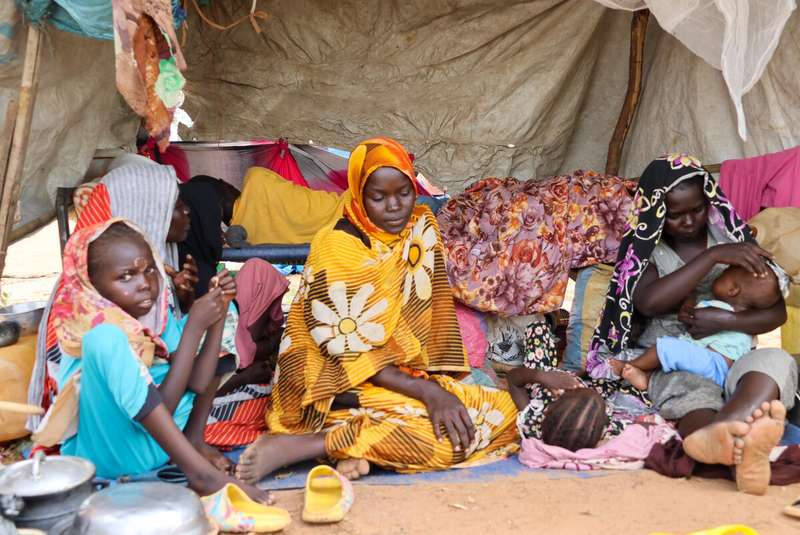Four months since renewed clashes in Sudan, the safety and survival of millions are at risk, warns World Vision
Media Contact :
August 28, 2023
Senior Public Relations Manager
[email protected]
m 404-735-0871
Media Contact :
August 28, 2023
Senior Public Relations Manager
[email protected]
m 404-735-0871

PORT SUDAN (August 28, 2023) — As the current conflict in Sudan enters its fifth month, the humanitarian needs of Sudanese children and their families continue to grow, with millions displaced and tens of millions hungry, global humanitarian organization World Vision warned today.
Since fighting erupted anew on April 15, more than 3.6 million people have been forced from their homes in search of safer areas inside the country, and more than 1 million have fled to neighboring countries, according to International Organization of Migration (IOM) data.
Food, water and medical supplies have become scarce. About 24.7 million people—half of the country’s population—require humanitarian assistance.
Hunger and malnutrition in Sudan were already at record levels prior to the fighting. The latest Integrated Food Security Phase Classification (IPC) report reveals that conflict and economic turmoil have driven more than 20.3 million people (more than 40% of the population) into high levels of acute food insecurity between July and September.
“Sudan faces a multi-layered humanitarian crisis which requires additional funding and global attention as needs continue to increase day by day,” said Emmanuel Isch, World Vision’s national director in Sudan. “Ultimately the conflict and crisis in Sudan are impacting millions of men, women and children who have been robbed of their safety and their freedom to go about their daily lives.”
Sudanese children are especially vulnerable. According to UNICEF, more than 2 million children have been forced from their homes since the clashes began, with an average of more than 700 children newly displaced every hour. UNICEF also notes that close to 14 million children need humanitarian support, with child malnutrition on the rise and millions out of school. “This will have long-term effects on the well-being of children across Sudan,” Isch added.
Amira, a young woman who fled Khartoum in May with her mother and children, is worried about her youngest son, Gasim, who is just 8 months old. The family has found temporary housing at a school that has been repurposed as a settlement.
“I noticed that I produce very little milk now, and this will affect my baby’s health sooner or later,” she said. A group of volunteers have secured milk for her son, but the food distributed at the settlement is not nutritionally balanced. Meanwhile, 12 families share six latrines, putting their health at risk from poor sanitation.
Amira is grateful for the assistance, but she continues to worry about her children’s well-being as well as that of her husband, whom she has not been able to reach since the fighting escalated.
Similarly, Seif, a father of three who fled to Merowe, north of Khartoum, is concerned about his children, as schools have remained closed. His youngest son, 9-year-old Mazin, hopes for peace. “I hope the war will end soon so that I can join my classmates and friends in Khartoum again,” he says.
World Vision is one of the largest humanitarian agencies active in Sudan, having worked in the country for 36 years. Over the past year, World Vision has reached more than 1.5 million people, most of them women and children, with emergency assistance, including programs focused on food security, child protection, health and nutrition, and water, sanitation and hygiene. After temporarily halting operations when the current conflict broke out, World Vision has resumed its work in the states of East Darfur, South Kordofan and Blue Nile, distributing food to over 190,000 people in addition to supporting community health centers, reaching more than 10,000 individuals in the past few weeks. The organization is also expanding operations in El Jezira state. It has also resumed some emergency water and sanitation activities in several locations. It is also responding to the needs of people fleeing Sudan to the neighboring countries of Chad, the Central African Republic, Ethiopia and South Sudan.
About World Vision
World Vision is a Christian humanitarian organization dedicated to working with children, families and their communities worldwide to reach their full potential by tackling the causes of poverty and injustice. World Vision serves all people, regardless of religion, race, ethnicity or gender. For more information, please visit worldvision.org or follow on X, formerly known as Twitter, @WorldVisionUSA.